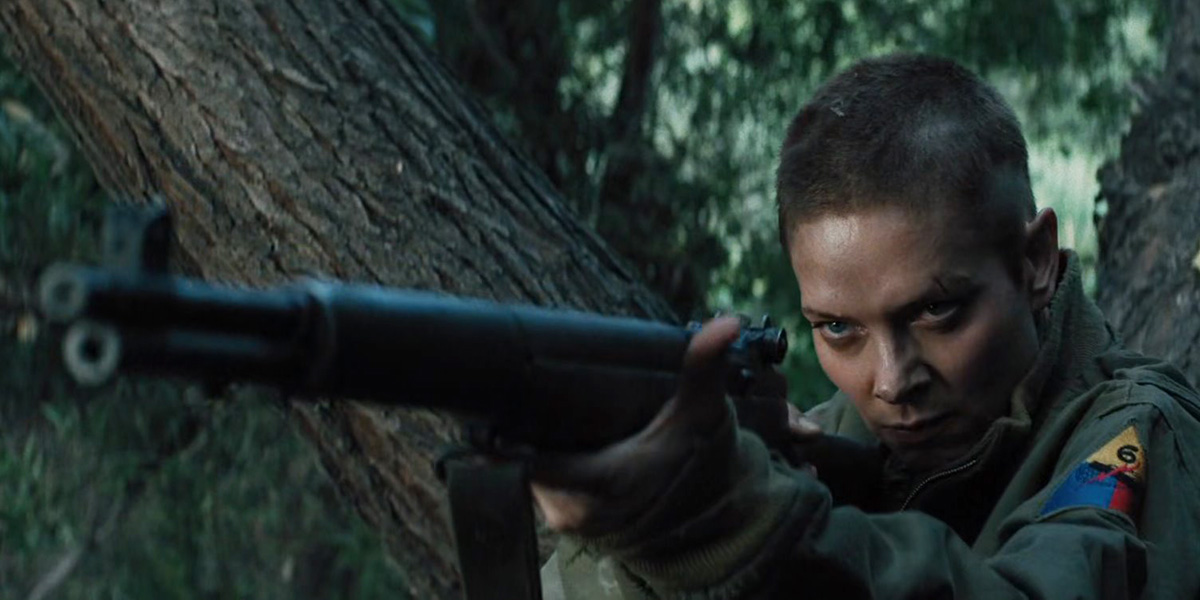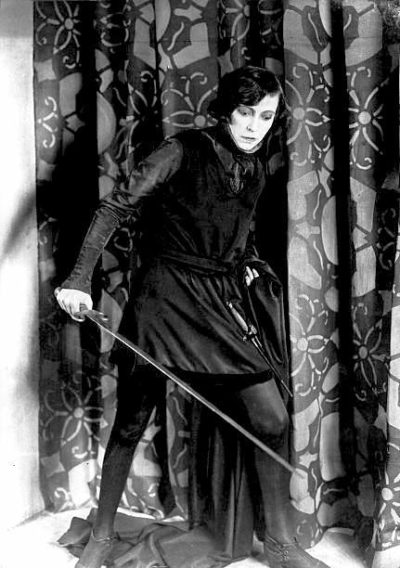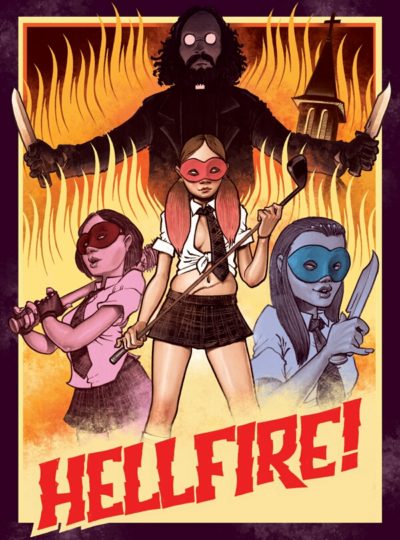 ★★★½
★★★½
“Grave consequences.”
I’m quite familiar with the work of director Jesse Johnson, mostly through his collaborations with Scott Adkins, who is probably the best action star you’ve never heard of. Some of their movies together have been top-tier, in particular Avengement, so I was very curious to see what he’d do with a film which – according to the cover – has a female lead. Well, that is slightly misleading in that the heroine does take a back-seat as far the action goes. But there’s still easily enough to qualify here, and she’s definitely not your typical character in a war-time setting like this.
To be blunt: Marie is a collaborator with the Nazis who occupied France. In particular, she was the mistress of S.S. officer Von Bruckner (Bernhardt), until their relationship goes pear-shaped (to put it mildly), and she’s shipped off to Ravensbruck concentration camp. Three years later, with the Allies sweeping through France, she is released and returns to her home-town. They haven’t forgotten her collaboration, so she has her head shaved and a swastika painted on her forehead. Marie is rescued from further indignity by Major Maitland (Mandylor) after playing her trump card, telling him she knows the location of a cache of gold in a local cemetery. However, on arrival there, it’s quickly clear they’re not the only ones after it. The gravedigger wants in, and Von Bruckner is also on his way back, hoping to collect the stash on his way out of the country.
There’s something quite Sergio Leone about this. The cemetery treasure idea is clearly taken from The Good, the Bad and the Ugly, along with the three-way stand-off at the end, and the way Marie tries to play the two sides against each other reminded me of A Fistful of Dollars. This isn’t as stylized, the cinematography is nowhere near as sublime, and it’s largely restricted to the single location of the cemetery. Yet it’s solid enough, and the lack of traditional “good guys” (or girls!) – another similarly to the spaghetti Western genre – is quite refreshing in the context. Everyone here is driven strictly by one imperative: getting the gold for themselves, by any means necessary: no-one is the slightest bit interested in returning it to its rightful owners.
Alliances are formed and dissolved as the Americans, French, Germans and Marie all look to come out on top, though there are nasty surprises for everyone as things unfold, and the Nazi forces arrive on the scene. This leads to an extended gun-battle around the tombstones, and eventually, the stand-off mentioned. I can’t say I felt the ending was entirely satisfying: it didn’t make sense, considering all that had gone before. Giving Marie more to do, rather than simply manipulating her way towards the gold, would have been nice. However, the journey to get there was briskly entertaining, and the freshness of the characters in this particular scenario, also helped sustain my interest with relative ease to the end credits.
Dir: Jesse V. Johnson
Star: Nina Bergman, Louis Mandylor, Daniel Bernhardt, Timothy V. Murphy
a.k.a. Ave Marie





 Over in my non-GWG life, I’ve been on
Over in my non-GWG life, I’ve been on  This version of the world is more or less identical to our own. Except, several hundred years ago, there was a catastrophe in which massive dragons rampaged around, with humans being collateral damage. A secret society called the Earthbound managed to end the thread, partly through the invention of the Spell Web – basically, an Internet for magic users. Now, the Earthbound and a secret government organization, the Supernatural Intelligence Group, operate to keep a largely oblivious population in the dark. Though everyone knows dragons are extinct… aren’t they?
This version of the world is more or less identical to our own. Except, several hundred years ago, there was a catastrophe in which massive dragons rampaged around, with humans being collateral damage. A secret society called the Earthbound managed to end the thread, partly through the invention of the Spell Web – basically, an Internet for magic users. Now, the Earthbound and a secret government organization, the Supernatural Intelligence Group, operate to keep a largely oblivious population in the dark. Though everyone knows dragons are extinct… aren’t they? This gets off to an impressive and intriguing start. Cora Fisher (Pribilski) has a perfectly normal life. Then, she’s involved in a car crash. The next thing she knows, she wakes up in a hospital bed. Oh, to which she is handcuffed. Before she can come to terms with that, she is informed that ten years have passed. And completing the triple-whammy, Texas Ranger Jim Krueger (Llorens) enters, and tells Cora he’s going to make sure she gets the death penalty for the murders she committed. It’s safe to say, the movie has successfully gained my attention by this point. Guided by mysterious cellphone texts, Cora escapes the hotel and goes on the run, seeking to find out the truth about what happened.
This gets off to an impressive and intriguing start. Cora Fisher (Pribilski) has a perfectly normal life. Then, she’s involved in a car crash. The next thing she knows, she wakes up in a hospital bed. Oh, to which she is handcuffed. Before she can come to terms with that, she is informed that ten years have passed. And completing the triple-whammy, Texas Ranger Jim Krueger (Llorens) enters, and tells Cora he’s going to make sure she gets the death penalty for the murders she committed. It’s safe to say, the movie has successfully gained my attention by this point. Guided by mysterious cellphone texts, Cora escapes the hotel and goes on the run, seeking to find out the truth about what happened.  I guess this shows that the concept of the “mockbuster” is not something invented by The Asylum. This came out in 1978, the year after
I guess this shows that the concept of the “mockbuster” is not something invented by The Asylum. This came out in 1978, the year after 



 This was a rather pleasant surprise. I was expecting a pretty naff entity, more interested in titillation than anything else. I actually got a thoroughly entertaining 90 minutes, with considerably better martial arts than I predicted. Sure, the story – as the tag-line above suggests – is hardly original, and the performances are… well, let’s say variable, and leave it at that. Yet this overcomes its limitations with heart and energy. It takes place in a recently abandoned school where a film club have gained permission to make a movie starring Sakura (Miyahara) and Maki (Aono). Shooting of their zombie epic is rudely interrupted by the arrival of a gang of miscreants, led by J-Rose (Morishita). They’re looking for five USB drives hidden in the school, that combine to give access to money embezzled by a previous school head. They lock down the establishment, and won’t let five schoolgirls get in the way.
This was a rather pleasant surprise. I was expecting a pretty naff entity, more interested in titillation than anything else. I actually got a thoroughly entertaining 90 minutes, with considerably better martial arts than I predicted. Sure, the story – as the tag-line above suggests – is hardly original, and the performances are… well, let’s say variable, and leave it at that. Yet this overcomes its limitations with heart and energy. It takes place in a recently abandoned school where a film club have gained permission to make a movie starring Sakura (Miyahara) and Maki (Aono). Shooting of their zombie epic is rudely interrupted by the arrival of a gang of miscreants, led by J-Rose (Morishita). They’re looking for five USB drives hidden in the school, that combine to give access to money embezzled by a previous school head. They lock down the establishment, and won’t let five schoolgirls get in the way.